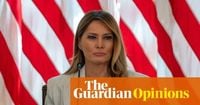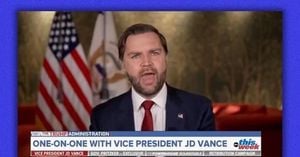Melania Trump made a striking return to the White House on September 4, 2025, stepping back into the public eye after a two-month hiatus with a message about the future—and a wardrobe to match. Wearing a double-breasted linen pantsuit by Italian designer Max Mara, the first lady joined President Donald Trump at a high-profile event on artificial intelligence, attended by some of the most influential figures in technology. The gathering marked not only her return to the national stage but also her bid to position herself as a champion of responsible AI innovation, particularly for America’s children.
According to USA Today, the AI-focused event drew OpenAI founder Sam Altman and Google CEO Sundar Pichai, among others, to the White House. Later that evening, Melania Trump changed into a black off-the-shoulder dress for an exclusive dinner with tech elites, including Meta’s Mark Zuckerberg, Microsoft’s Bill Gates, Apple’s Tim Cook, and Google’s Sergey Brin. Notably absent was Elon Musk, the high-profile leader of Tesla and SpaceX, who confirmed via social media that he had been invited but could not attend due to prior commitments. Musk’s absence came on the heels of a very public falling out with President Trump earlier in the summer.
Melania’s appearance at the AI event was more than ceremonial. She delivered a speech that signaled her intention to help guide the nation’s approach to artificial intelligence, especially as it relates to children. “The robots are here. Our future is no longer science fiction,” she declared, as reported by USA Today and other outlets. She called AI the “greatest engine of progress in the history of the United States of America,” and urged leaders and parents to “manage AI’s growth responsibly.” In her words, “During this primitive stage, it is our duty to treat AI as we would our own children.”
Melania Trump’s advocacy for AI comes as part of a broader effort to brand herself as a forward-thinking figure in technology. Over the past year, she has embraced emerging trends, from NFTs and cryptocurrency to using an AI-generated version of her own voice for the audiobook edition of her memoir. In August 2025, she launched an AI contest for students in grades K-12, encouraging young Americans to engage with the technology in creative and responsible ways. These moves have been widely seen as attempts to cast herself as the face of responsible innovation in the Trump administration.
But not everyone is convinced of her leadership in this space. As The Guardian points out, Melania Trump’s appearances at the White House are infrequent, and she has made it clear that she is not bound by the traditional expectations of her role. Instead, she picks her moments—often aligning her public presence with issues that intersect with her personal interests or the administration’s broader agenda.
One such issue is online safety for children. Melania has been vocal in her support for the Take It Down Act (TDA), a piece of legislation passed earlier in 2025 that criminalizes the nonconsensual distribution of intimate imagery, sometimes referred to as “revenge porn.” She has touted her role in championing the TDA, stating she “championed online safety through the Take It Down Act.” The law, which passed Congress with bipartisan support, is meant to address the growing threat of image-based sexual abuse, including both authentic and AI-generated content.
However, the TDA has not been without controversy. Critics argue that the law’s broad provisions could threaten free speech and be weaponized to suppress lawful content. Dr. Mary Anne Franks, President of the Cyber Civil Rights Initiative, expressed both satisfaction and concern in a statement earlier this year: “I am gratified that the [TDA] incorporates much of the language of the model federal statute against NDII I first drafted in 2013. But the Take It Down Act also includes a poison pill: an extremely broad takedown provision that will likely end up hurting victims more than it helps.” The Electronic Frontier Foundation echoed these worries, warning that the TDA gives “the powerful a dangerous new route to manipulate platforms into removing lawful speech that they simply don’t like.”
Even President Trump has weighed in, saying, “I’m going to use that bill for myself too if you don’t mind, because nobody gets treated worse than I do online, nobody,” during a joint session of Congress. This statement underscores the concern that the law could be exploited by those in power for personal or political gain.
While Melania Trump’s push for responsible AI and online safety has garnered headlines, her role as a technology advocate comes amid broader criticism of the Trump administration’s approach to education and information access. As noted by The Guardian, the administration has moved to defund Head Start, a federal early childhood education program for low-income families, and has canceled grants that historically funded children’s educational programming, such as Sesame Street. The administration has also faced accusations of censorship, including efforts to curtail education about slavery, book bans, and attempts to influence Wikipedia content related to Israel.
These moves have prompted skepticism about the administration’s commitment to using AI and technology to enhance equity and expand knowledge. Critics argue that, rather than empowering children and educators, the administration’s policies may restrict access to information and divert taxpayer funds to tech industry leaders who maintain close ties to the White House. As Christopher Hinton, dubbed the “godfather of AI,” warned in a Financial Times interview on September 5, 2025, AI “will make a few people much richer and most people poorer.” This sentiment reflects broader concerns that the rapid adoption of AI could exacerbate social and economic inequalities rather than alleviate them.
Amidst these debates, Melania Trump’s style and public persona continue to draw attention. Her choice of Max Mara, a favorite label, for her return to the White House was widely noted by fashion commentators and political observers alike. Her deliberate, sometimes enigmatic approach to public life—eschewing the traditional duties of a first lady in favor of select, high-impact appearances—has become a hallmark of her tenure.
Yet, as she steps into the spotlight to champion responsible AI, Melania Trump faces the challenge of convincing both supporters and skeptics that her initiatives are more than symbolic. With the stakes of AI innovation rising and the societal impacts of technology under increasing scrutiny, the first lady’s efforts will be closely watched—not just for their rhetoric, but for their real-world consequences on children, education, and the future of American society.
As the robots arrive and the tech titans gather, the conversation about AI’s role in shaping the next generation is just beginning. Whether Melania Trump’s vision of watchful empowerment prevails—or is overshadowed by broader concerns about equity, free speech, and the concentration of wealth—remains to be seen.




